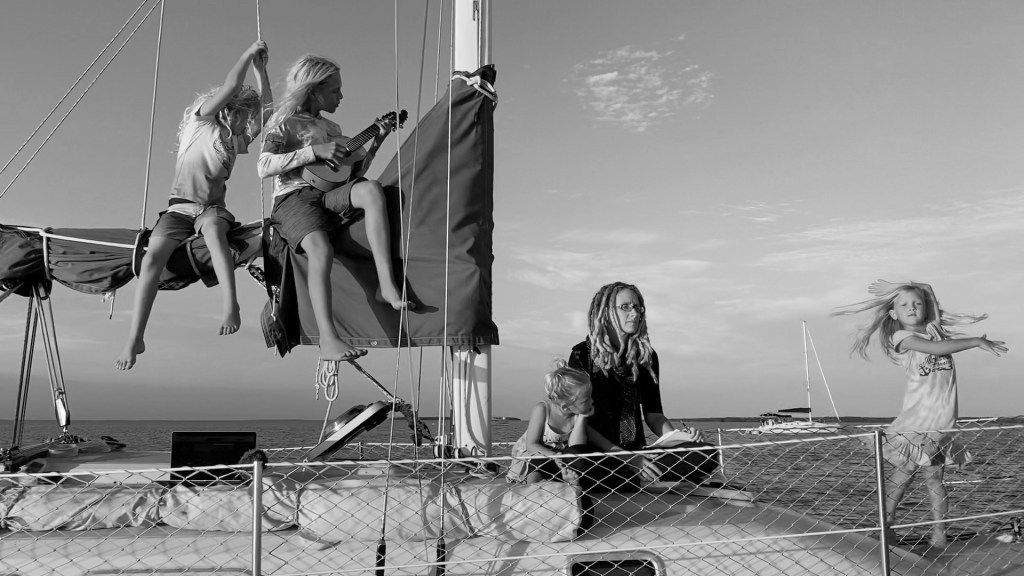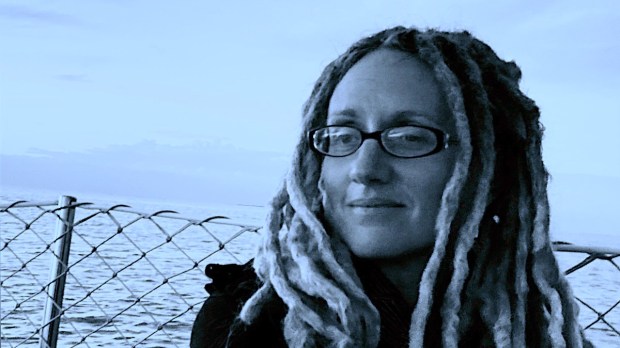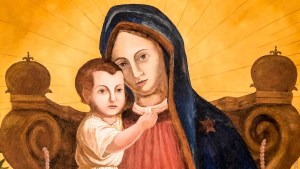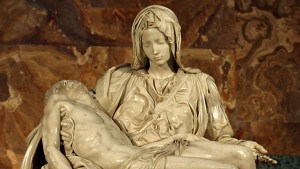The poet Anna Key’s collection After Colonna appeared on Aleteia’s 2023 Summer Book List. I recently spoke with her about how her poems, inspired by the work of the Renaissance poet Vittoria Colonna, reimagined Colonna’s sonnets in new and surprising ways. Anna Key also spoke about what it means to engage poetically with another time period. You may read the first part of the interview here.
Our conversation continues …
I have some favorite poems in your collection, After Colonna. For instance, there’s the one that was published in the Word on Fire Journal about the Blessed Virgin Mary that I found particularly affected me. I shared this one with Aleteia readers.I’ve also quoted from the sonnets numerous times in my homilies.Do you have any favorite or particularly memorable poems from the collection? Poems that you struggled with or found particularly inspired?
It’s strange to say, as I was thinking about this question, I realized that after I finished the sonnet sequence and the work emerged as After Colonna, I put the bilingual edition of Colonna’s sonnets on the shelf and turn to it now only by way of answering questions about the relation between the two. When I’m struggling in a day and need to find a source of spiritual consolation to make it through, I open After Colonna at random and see what the sonnet on the page has to say to me. And it speaks to me as a reader, as a searcher after truth and meaning, as a sojourner, and not as an author. There are always snags, of course, places where I see myself and my failures; but when I turn to a sonnet that has no snags, one of the gift poems that seems to be presented on the page, fully formed, wholly itself, I feel the great consolation that comes with knowing that we are, at our best, reflections of God’s grace, like the moon. What light these poems have is neither Colonna’s nor mine, but Christ’s.
I love many of these poems, some more so, some less. As I said in the foreword to the collection, I approached Colonna’s sonnets as a spiritual exercise. On any given day, I’d read a sonnet, read it again, think about it, reflect on it; and then set it aside, look at the world around me and the world within, let the things I was seeing and feeling begin to merge with Colonna’s images and feelings, let them interweave and pull apart again, like waves at their edges on the shore, where they are coming and going at the same time. Perhaps an image would stay with me, or a phrase; perhaps an idea or a feeling; once in a while nothing at all that I could put my finger on, but then a line would come to me, and I’d begin there, trusting that somehow her poem had opened the door onto that particular spiritual landscape. Some poems were so rich that I would repeat this process stanza for stanza or line for line; other times, perhaps my state of mind was wrong, or the movement of a particular sonnet wouldn’t sing to me, and I’d go off of the poem, wander about, and see what happened. It was very much a journey, with the ups and downs that all journeys have, some days of hardship, others of glory, and everything in between.
Even in a sonnet sequence as great as someone’s like Shakespeare’s, there are some sonnets that are just ethereal in that near perfection which is as near as we get to perfection in time, and others that don’t work as well for whatever reason. You can see Shakespeare working towards the expression of a single intuition over and over, reworking the same images, trying a different wording, coming at the same idea from as many angles as he could muster; and one of them just breaks through like a defined ray of sunlight from behind a cloud; and those are the ones we carry with us. Of course, you don’t get that breakthrough ray without the clouds. So, in this sequence there are some sonnets that seemed to break through to me, others that are edged with light like a cloud lit up at the margins in a particularly striking or surprising phrase or image, others that remain cloudy. Sonnet 5 was one of the break-through moments for me, so also Sonnets 14, 48, 97. There are others. What breaks through for me might not for you; or at least that’s the way it should be, if the poems are hospitable in the way all good poems should be and make room for you to have your own thoughts, to find your own way.
In her day, the fact that she was a woman with a public presence in the arts made Colonna quite notable. One of the sonnets I love so much is about the motherhood of the Blessed Virgin Mary. It seems to me that only a woman could have written that poem, but I wonder if you would agree. Is it significant that both you and Colonna are female poets?
Yes, is the short answer. Although I return again and again to the poems of Eliot and Neruda, Hopkins and Rilke, it is the female poets — the poetesses — that have had the deepest and most abiding presence in my life and work, beginning with Emily Dickinson. I carried around her complete works with me — now tattered and worn and falling apart — for decades. After Dickinson, and after my conversion to Catholicism, I found the work of Chilean poet Gabriela Mistral, and she also became a companion and kind of mother-figure to me. I have been working on another project, an after-work of Mexican poet Sor Juana Ines de la Cruz’s epic poem, First Dream, and her poetry has also deeply informed my own. (Incidentally, I think critic Octavio Paz, whom I respect in every way, fundamentally misinterprets Sor Juana’s work, and hope someday to have time to write a defense of her searching and humble poem to restore it to the deeply Catholic journey it was and is.) Beyond these, in graduate school I found the work of little-known Californian poet Killarney Clary, whose luminous prose poems opened the door that led me, ultimately, to Notebook of Forgetting. And then Colonna, whose Sonnets for Michelangelo led me to After Colonna.
So, the particular character of the feminine poetic vision, especially as it pertains to a certain way of undertaking spiritual pilgrimage, has been really critical to my own development as a poet and thinker. It’s one of the best things about becoming Catholic, discovering all of these majestic and powerful female voices among the saints and prophets and poets, beginning of course with Holy Mary, the Mother of God, as source and summit of this beautifully unique feminine vision; then recalling, just to name a few who have helped me in my own spiritual journey: Catherine of Alexandria, Teresa of Ávila, Thérèse of Lisieux, Catherine of Siena, Mother Teresa, Edith Stein, Gianna Beretta Molla, Elizabeth Anscombe and so many other magnificent examples of strong women in Catholic history whose voices and visions have transformed our world. I’m very blessed by all of these visionaries and so grateful to know them through their lives and works.
On a personal note, the Sonnets for Michelangelo had particular resonance for me, because I am married to the searching and devoted arti+st, Tom Break, without whom I could not have written anything I have written. Following his own journey, spending hours, decades visiting museums and looking long and long at paintings, his and others, made it possible for me to really see into the images and questions that were motivating a lot of Colonna’s sonnets and helped me to write poems like Sonnet 45, “Luke’s virgin is imperfect,” which I absolutely could not have written without the decades-long conversation Tom and I have had. So Colonna’s presence as a woman-poet engaged in a deep artistic friendship with Michelangelo made this project especially meaningful to me.

I’ve alluded to your passion for living poetically. Rumor has it that you live as off-the-grid as possible with your artist husband and children. (I’m kind of surprised that you actually checked your email to make this interview possible.) Can you tell us more about the deliberate choices you’ve made for living with a minimum of material comfort and other distractions. How has this affected you? Why is poetry, and living poetically, so important that you’ve made such a massive effort in that direction?
It’s definitely surprising that I checked my email, a thing I do less and less often these days! And the rumor is true: Tom and I live on a small sailboat with our four children (ages 14, 11, 8, and 5), currently somewhere off the coast of Florida. We moved aboard before our youngest was born and have had to resist the near-constant insistence that we need to buy a bigger boat (our boat, a 28-foot monohull sloop, has the landed equivalent of about 280-square feet of space). Admittedly, we’ve had to remove the inboard engine, the water heater, the fuel and water tanks, the refrigerator, and a host of other tanks, hoses, wires and miscellaneous marine accoutrement to make room for our growing children and the provisions necessary to feed them. But we love our boat and our life on the water and would not-could not be the artists we are without it.
Moving off-grid, especially moving from land to water, requires a leap of faith. You have to leave so many comforts, securities and expectations behind to live this way that it changes everything. It is, truly, a massive effort to make that leap, and to live where you land — but absolutely worth it. I studied Heidegger as a graduate student in philosophy, and his essays about poetic dwelling in Poetry, Language, Thought were really formative for me. He takes a phrase from the poet Hölderlin, “…poetically man dwells…,” and writes: “If need be, we can imagine that poets do on occasion dwell poetically. But how is ‘man’ — and this means every human being and all the time — supposed to dwell poetically?”
Here’s a quick take on Heidegger’s answer: live under the sky, on the earth, in praise of God, and in full view of our mortality. There’s a lot more to say about that of course, but just think of how much our closed-room worlds — with our HVAC systems and parking lots, paved roads and sidewalks, blank white ceilings, screens chaining us like prisoners in Plato’s cave to only ever seeing the shadows flickering on the wall — think of how much this way of life removes us from being under the open sky, with our feet on the earth, and with a deep, abiding, meaningful sense of our Creator and our mortality. Simple as that “four-fold” vision may be, we’ve managed to forsake it almost entirely. Which means that we’re working very hard to forsake our own humanity. Because if Heidegger is right — and I think he is — then dwelling poetically isn’t just a lifestyle choice, it’s constitutive of our very being as human beings.
I’m currently at work on a book of essays called Notes on Poetic Dwelling, which if the stars align, I’ll be able to finish in the hopefully not-too-distant future. My family and I also launched, then abandoned, and are now relaunching in response to a felt call a YouTube channel about our life aboard that attempts in visual essays to document our search after poetic dwelling. It’s an imperfect form, to draw people to screens in an effort to reach through and beyond them. But perhaps, in the end, they really are windows that we can come through, as Neruda says, in order “to live with rivers and animals and beasts…to discover things, to be in the sea, to be in the mountains, and approach every living thing.” For how, as Neruda asks, can you not love such an approach to life, that has such extravagant surprises?



